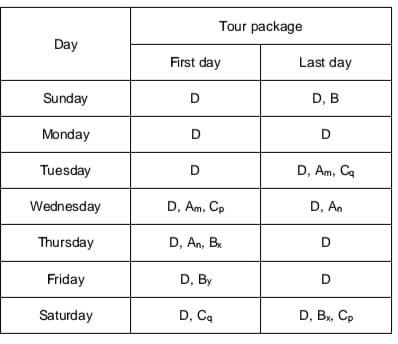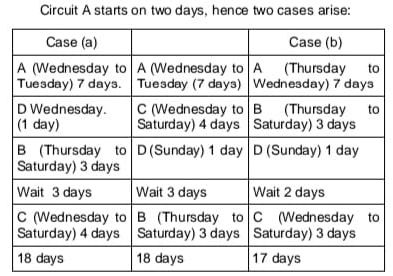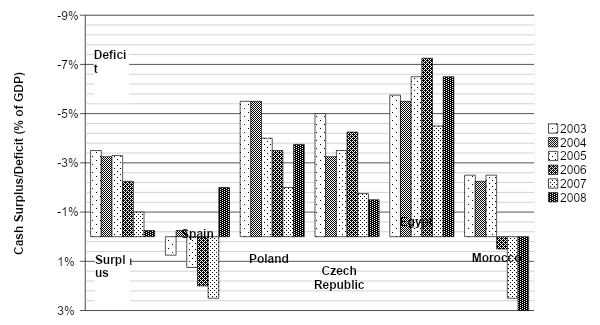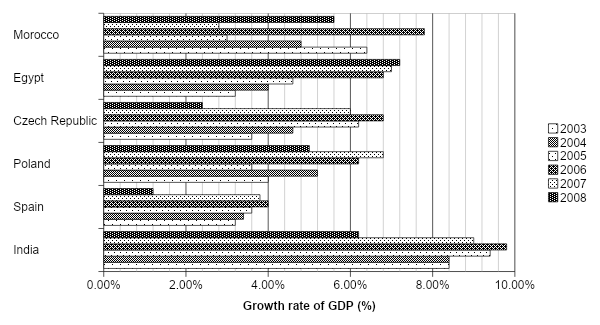Great Lakes - PGDM & PGPM Admissions 2026
Application Deadline: 10th March | Globally Recognized by AACSB (US) & AMBA (UK) | 17.8 LPA Avg. CTC for PGPM 2025
As the CAT 2024 examination date approaches, the urge to prepare accurately grows. You may be wondering how to study, what technique to use, and which resources are ideal for practice. In this 60-day preparation plan from Careers360, On Day 32, we are focusing on the CAT Mock Test to assist you prepare.
This Story also Contains

This article includes subject- and topic-specific sample papers with answers. To have a solid understanding of the CAT exam, download CAT practice papers from all three sections. The practice sets are based on what has been learned during the preceding 31 days. By working through these sample papers, you may avoid negative marking in objective questions while boosting your time management for the actual exam.
This Practice Set (best test series for CAT) consists of three Sections:
Q1. Neeru and Bajwa can do a piece of work in 10 days and Neeru alone can do half of it in 6 days. In how many days can Bajwa do 25% of the work alone?
60 days
30 days
15 days
45 days
Application Deadline: 10th March | Globally Recognized by AACSB (US) & AMBA (UK) | 17.8 LPA Avg. CTC for PGPM 2025
Ranked among top 10 B-Schools in India by multiple publications | Top Recruiters-Google, MicKinsey, Amazon, BCG & many more.
Ans: (c)
Neeru can complete work alone in 12 days.
Neeru and Bajwa together can complete the work in 10 days.
Let the total work is 60 units (LCM of 10 and 12)
Neeru’s 1-day work = 60/12 = 5
Neeru and Bajwa’s 1-day work = 60/10 =6
Bajwa’s 1-day work = 6 – 5 = 1
Bajwa can complete total work in 60/1 = 60 days
So, Bajwa can finish 25% work in 15 days.
Q2. A, B and C can do some work in 36 days. A and B together do twice as much work as C alone and A and C together can do thrice as much work as B alone. If A got Rs 300 for his work. How much B will get?
Rs 72
Rs 180
Rs 90
Rs 120
Ans: (b)
Let the Total work is 36 units.
If C does 1 unit of work, A and B together will do 2 units of work.
So, work done by C = 1/3 (36) = 12 units
If B does 1 unit of work, A and C together will do 3 units of work.
So, work done by B = 1/4 (36) = 9 units
Amount of work done by A = 36- 12- 9 = 15 units
The ratio of wages of A, B and C
A: B: C = 15: 9: 12 = 5: 3: 4
Amount received by B = 300 x 3/5 = Rs 180
Q3. A finishes 6/7th of the work in 3z hours, and B works thrice as fast and finishes the remaining work. For how long did B work?
z/6
3z/6
z/7
z
Solution: [A]
Since B is thrice as efficient as A. So, B will finish 6/7th work in z hrs.
Therefore, B finishes 1/7th of work (remaining work) in z/6 hrs.
Q4. Rosy and Harry travel the same distance at the rate of 7 km per hour and 13 km per hour respectively. If Rosy took 3 hrs longer than Harry, the distance travelled by each is
6 km
10 km
45.5 km
20 km
Ans: (c)
Since distance is the same
SR/ SH = TH/ TR
⇒ TH/ TR = 7/13
⇒ TR - TH = 13x -7x = 3hrs
⇒ x = 0.5 hrs
Time taken by Rosy = 13 x 0.5 = 6.5 Hrs
Distance = 7 x 6.5 = 45.5 Kms
Q5. Lonavala and Khandala are two stations 556 km apart. A train starts from Lonavala and moves towards Khandala at the rate of 27 km/h. After 4 hours, another train starts from Khandala at the rate of 29 km/h. How far from Khandala will they will cross each other?
250 km
300 km
279.166 km
232 km
Ans: [d]
According to the question:
After 4 hours distance between the two trains = 556 – 27x 4= 448 Kms
Relative speed = 27 + 29 = 56 Km/ Hr
Time taken to cross each other after the train from Khandala left the station = 448/56 = 8 hrs.
Distance from Khandala at the time of crossing = 8 x 29 = 232 Kms
Q6. Amit travels from A to B 1/3 of the distance by a car with a velocity of 10 km/h, the next 1/3 with a velocity of 25 km/h and the last 1/3 with a velocity of 40 km/h. In return journey, Amit travels with a velocity of 18 Km/Hr throughout. Which of the following is true?
Time taken in travelling distance from both sides is equal
Average Speed during A to B is less than Average speed from B to A.
Average Speed during A to B is 1% more than Average speed from B to A.
Average speed during B to A is 1% less than Average speed from A to B.
Ans: (c)
Let the total distance is 300 Km
Case 1: (A to B)
1/3rd of the distance (100) travelled with the speed of 10 km/hr; time taken = 100/10 = 10 hrs
1/3rd of the distance (100) travelled with the speed of 25 km/hr; time taken = 100/25 = 4 hrs
1/3rd of the distance (100) travelled with the speed of 40 km/hr; time taken = 100/40 = 2.5 hrs
Average Speed = 300/ (10+ 4+ 2.5) = 18.18 km/ hr
Case 2: In the return journey, average speed = 18 km/hr
Q7. After receiving two successive raises, Harish’s salary became equal to 21/7 times his initial salary. By how much percent was the salary raised the first time if the second raise was twice as high (in percent) as the first?
15%
20%
25%
50%
Ans: (d)
Let the first raise in salary be x%
Then the second raise be 2x%
Net percentage change = [x + 2x + x(2x)/100] % (Using the formula of net percentage change in successive change)
Harish’s salary became equal to 21/7 times his initial salary i.e. 3 times of initial salary which means there is a net increase of 200% in the salary.
Therefore,
x + 2x + x(2x)/100 = 200
⇒ 300x + 2x2 = 20000
⇒ x2 + 150x – 10000 =0
On solving, x = 50%
CAT Mock Paper Directions (Q1-Q4):
Comprehension:
A tour operator operates one tour package each in four different circuits. Each tour starts at 7 am from the office on a bus on the first day of the tour package and ends by dropping the tourists back at the office at 7 pm on the last day of the tour package. The four tour packages are
(i) Circuit A – Seven days duration which starts every Wednesday and Thursday
(ii) Circuit B – Three days duration which starts every Thursday and Friday
(iii) Circuit C – Four days duration which starts every Wednesday and Saturday, and
(iv) Circuit D – A daily tour of 12-hour duration.
Q1. If a person has started his tour with Circuit A, then what is the minimum number of days required for him to completely tour all the circuits?
18 days
17 days
16 days
15 days
Ans: B
The given information can be tabulated as below:
[Note: The subscript under the circuit name (A, B and C) is to differentiate the two tours in the same circuit that start on different days of the week.]

The subscript under the circuit name differentiates the two tours in the same circuit that start on different days.

Alternate solution: Starting with circuit A, it is clear that after taking two tours, one has to definitely wait (The waiting period is from Sunday to Tuesday). This wait can be minimized if the daily trip is planned for one of these three days. Further, the tour after the wait has to be A or C which starts on a Wednesday. Since we are starting with A, the last tour has to be C (for the minimum wait). Because A ends on Tuesday or Wednesday, D shall not be immediately after A, thus in the order A, B, D and C, with A starting on Thursday, the tour can be completed in 17 days. Choice (B)
Q2. To completely tour all four circuits in the shortest possible time, with which tour does a person shall start his touring?
Circuit C on Saturday
Circuit B on Friday
Circuit C on Wednesday
Circuit B on Thursday
Ans: A
If we observe the given information, out of all the tours that end and start on two consecutive days, all the tours are available between Tuesday and Thursday. C ends on Tuesday, A starts on Wednesday, which ends on Tuesday, D ends on Wednesday and B starts on Thursday. Hence, the tour shall start with C which starts on a Saturday.
Choice (A)
Q3. On which day of the week, will there be the least activity at the tour operator’s office?
Sunday
Friday
Monday
Saturday
Ans: C
Only on a Monday, tourists of only one tour come to the office (either start or end the tour).
Choice (C)
Q4. If a person wants to complete all the circuits in the shortest possible time but with one day rest between any two tour packages, what is the best day for a person to start touring?
Friday
Monday
Sunday
Wednesday
Ans: (D)
A (Wednesday – Tuesday) + B (Thursday – Saturday) + D (Monday) + C (Wednesday – Saturday). The tour shall start on a Wednesday.
Choice (D)
CAT Mock Paper Comprehension:
Cash Surplus is the excess of cash revenue over cash expenditure (deficit if this is negative). Rather than the absolute value of this surplus/deficit, it as a percentage of GDP is a more important measure. The following graph gives the cash surplus/deficit as a percentage of GDP for 6 countries for each year from 2003 to 2008. Deficits are shown above the X-axis and Surplus is below the X-axis.

The following graph gives the growth rate of the GDPs of the same countries for the same time interval.

Each of the questions below pertains to only the 6 countries for which data has been given in the above graphs.
Q5. Which country had the highest cash deficit in the year 2004?
Spain
Egypt
Poland
Cannot be determined
Ans: (d)
Since we do not know the actual GDP values for any of the countries, we cannot have any idea of the value of the cash deficit.
Q6. Which country’s cash deficit increased by the greatest rate from the year 2004 to 2005?
India
Czech Republic
Egypt
Cannot be determined
Ans: (c)
The growth rate of the cash deficit is the net effect of the growth rate in ‘deficit as a percentage of GDP’ and the growth rate of the GDP [because Cash deficit = (Deficit as a % of GDP) × (GDP)]
Looking at the options …
India: Growth rate of GDP in 2005 is 9.4% and the growth rate in ‘deficit as a percentage of GDP’ is almost negligible (from 3.25 to 3.3 i.e. a percentage increase of 0.05/3.25 i.e. 5/325 i.e. 1/65 i.e. approx 1.5%). Thus, the growth rate in the deficit will be a little more than 9.4%
Czech Republic: The growth rate of GDP in 2005 is 6.2% and the growth rate in ‘deficit as a percentage of GDP’ (from 3.25 to 3.5) is 0.25/3.25 i.e. 1/13 i.e. 7.7%. Thus, the growth rate in deficit will be 6.2 + 7.7 + (6.2 × 7.7)/100 = 13.9 + 0.4 = 14.3%
Egypt: Growth rate of GDP in 2005 is 4.6% and the growth rate in ‘deficit as a percentage of GDP’ (from 5.5 to 6.5) is 1/5.5 i.e. approximately 18%. Thus, the growth rate in the deficit will be 4.6 + 18 + 0.8 = 23.4%
Thus, the largest growth rate in the deficit will be for Egypt.
Q7. Find the ratio of the cash surplus of Spain in the year 2005 to its cash surplus in the year 2007.
1: 2
1: 2.15
1: 2.3
1: 2.5
Ans: (b)
If the GDP of Spain in 2005 is x, then the required ratio is
let’s use a + b + ab/100 to find the net effect of a 4% increase and 3.8% increase. It will be 4 + 3.8 + 0.152 = 7.95%, say approx 8%.
Thus, the required ratio will be i.e. 1: 2.16. The closest option choice is (b)
Q8. Find the ratio of the cash deficit of Poland and the Czech Republic in the year 2005.
3: 4
2: 3
1: 2
Cannot be determined
Ans: (d)
Since the ratio of GDP’s of Poland and Czech are not known for any of the years, the ratio cannot be determined
CAT 2024 Sample Paper: Reading comprehension
The hotline conversation between the Director Generals of Military Operations (DGMO) of India and Pakistan and their agreement –
“To undertake sincere measures to improve the existing situation ensuring peace and avoidance of hardships to the citizens”
“To fully implement the ceasefire understanding of 2003 in letter and spirit forthwith” is a long-awaited development.
The wording of the near-identical statements issued by India and Pakistan is the most promising heard from the bilateral front in the last two years, especially the recommitment to the 2003 ceasefire. It was the ceasefire that paved the way for the Vajpayee-Musharraf statement of 2004 and the dialogue that lasted until the Mumbai attacks.
What Tuesday’s agreement may lead to is still uncertain. It is sufficient that the two sides have unequivocally said they will respect the ceasefire. Scores of civilians living along the LOC have perished in these incidents, which spiked after the 2016 attack on the URI garrison and the subsequent strike by India inside POK.
In the same period, India lost more soldiers in ceasefire violations than in any other period of peacetime. On the same day as the DGMOs spoke, the Kashmiri separatist leadership, responding to Union Minister Rajnath Singh’s offer of talks, indicated it was open to dialogue with the Centre, without any mention of its usual preconditions.
If all this does not square with the Pakistan Army-created commotion over a book-length conversation between two long-retired spy bosses of India and Pakistan in which neither says anything that is not already in the public realm, it is because in India-Pakistan relations, trying to reconcile everything is near impossible. The Pakistan Army’s decision to pull in its former DG ISI and put him on the “exit control list” for shooting the breeze with his friend, a former head of RAW, on Kargil among other things, should be seen as a piece with the power struggle in Pakistan.
A general election is due to be held in Pakistan in a couple of months, and a former chief justice has been appointed to head the caretaker government. The disqualified-for-life Nawaz Sharif has been addressing rallies and public meetings, alleging the Army was behind his removal, and indeed, behind all Pakistan’s problems. His remarks that “non-state actors” had been allowed to cross Pakistan’s borders and kill “common people” in Mumbai have not gone down well with the army. The Former DG ISI, not particularly known as a friend of Pakistan’s civilian governments, broadly vindicates Sharif’s position in the book co-authored with his Indian friend. His former institution had to act quickly before the carefully built-up narrative against the “anti-national” Sharif started disintegrating. For the Pakistan Army, though, the real message is that narratives cannot be controlled beyond a point. That the entire drama unfolded at a time when India and Pakistan have taken steps to reduce hostilities only makes the self-serving nature of nationalist narratives more obvious.
Q1- As per the passage, Nawaz Sharif was disqualified from his duties. Whom did he allege for his disqualification?
The DG, ISI
The Government
The Army
Civilians
None of these
Ans: (3)
Explanation: Refer to 3rd paragraph 2nd line.
Q2. Which of the following statements is/are correct in context to the passage?
Ceasefire paved the way for the Vajpayee-Musharraf statement of 2004.
The former DG ISI justifies Sharif’s position in a book co-authored with his Indian friend.
A general election is due to be held in Pakistan in a couple of months, and a former chief justice has been appointed to head the caretaker government.
Only 1
Only 2
Both 2 and 3
All are correct
None of the above
Ans: (4)
Explanation: Refer to 1st para 6th line, refer to 3rd para 6th line, Refer to 3rd para 1st line
Q3. As per the passage, what were the postulates of the agreement that awaited development between India and Pakistan?
Improving the existing situation and ensuring peace to citizens.
Full implementation of the ceasefire understanding of 2003 in letter and spirit forthwith.
To successfully conduct general elections to be held in Pakistan.
Both (a) and (b)
All the correct
Ans: (4)
Explanation: Refer to 1st para 1st four lines.
Q4- What is meant by the idiom “shooting the breeze” used in the passage?
Enjoying a pleasant weather.
Spend time thinking about good times.
To spend time talking about things that are not important.
To do something different and amazing.
None of these
Ans: (3)
Explanation: Shooting the breeze- to spend time talking about things that are not important.
Q5- Which of the following statements cannot be inferred from the following passage?
Scores of deaths of civilians along the LOC spiked after the 2016 attack on the URI garrison
India lost less soldiers in ceasefire violations than at any other period of peace time.
Restoring friendly relations between India and Pakistan is near to impossible.
Only 1
Only 2
Only 1 & 2
Only 3
All three
Ans: (2)
Explanation: Statement 2 is incorrect. Refer 1st para's last 4 lines.
Q6: Choose the word which is Most similar to the word PERISH given in the passage.
Revive
Flourish
Succumb
Thrive
Subsist
Ans: (3)
Explanation: Perish: to cause to die
Succumb: fail to resist pressure, temptation, or some other negative force/ die from the effect of a disease or injury
Error Detection
Q7: Her mother told her often (a)/ that she spent too much money (b)/ but she never listened. (c)/ No error (d)
Ans (a) her mother often told her in place of her mother told her often
Explanation: adverb of frequency always comes before the verb.
Q 8: If we had been one more good batsman in our team, we would have won the match.
Had had
Would have been
Would have
Would have had
No correction required
Ans (a) had had in place of had been
Explanation: this is also an example of an unfulfilled condition but in this sentence, we see the use of been is a conditional clause which is incorrect according to the grammar been is the form of be but here the meaning of the sentence is to have so we use had as the perfect form of have with the active verb had.
Question 9: He was so much (a)/ disappointed that he (b)/ hid himself in the room(c)./ No error(d)
Ans-(c) Remove ‘himself’
Explanation: we do not use reflexive with the verb hide.
Q10: Last month I went to mount Abu and enjoyed very much.
Enjoyed too much
Enjoyed myself very much
Enjoyed me very much
No improvement
Ans: (b)
Explanation: if there is no object given with Enjoy verb then we have to use reflexive.
With these free CAT mocks, an aspirant can strengthen his/her preparation. Also, we have provided CAT 2024 Sample Paper in the last of this series, which will be very helpful for all the aspirants.
Frequently Asked Questions (FAQs)
To solve passages first read all the questions and then search for keywords being asked in the questions. If still you don't find the answers then try to find answers paragraph wise and mark the question being solved. This approach is best to solve passage as it save your time and efforts, and help you score well in CAT exam
The net percentage change evaluates how much a value has risen or reduced in comparison to its initial quantity, represented as a percentage. To compute it, first determine the difference between the final and beginning values, then divide by the initial value and multiply by 100.
If two objects are approaching one other, their relative speed equals the total of their individual speeds.
When two objects travel in the same direction, their relative speed is calculated by calculating the difference between their speeds.
Relative speed is the rate at which two things move in respect to one another, allowing us to determine how rapidly the distance between them changes.
On Question asked by student community
Dear Saloni,
May i know which college you are looking to apply for? Because the MBA fee varies from one college to another. Please check MBA fees colleges wise here:
MBA Fees in India 2025: Top Colleges, Fee Structure, Courses, Cost of MBA
Check your devices and email; you may still have the soft copy of the Admit card. If not, don't panic, the CAT 2025 admit card may not be a huge requirement after the exam; the CAT scorecard is usually asked for the admission formalities.
Hello,
Here are some top colleges accepting XAT and CAT exams :
Top colleges accepting CAT:
IIMs (All Indian Institutes of Management)
FMS Delhi
SPJIMR Mumbai
MDI Gurgaon
IIT Bombay (SJMSOM)
IIT Delhi (DMS)
IIFT
IMT Ghaziabad
JBIMS Mumbai
Top colleges accepting XAT:
XLRI Jamshedpur
XIMB Bhubaneswar
IMT Ghaziabad
Great
Hi ,
can you please specify the question like in NIT trichy are you looking for admission in B. tech program .
If yes for B. tech program then JEE main exam is necessary and the cut off for each branch may vary.
https://engineering.careers360.com/articles/jee-main-cutoff-for-nit-trichy
Hi there,
A female candidate with a CAT percentile of 67.97 and low sectional scores should target private and tier-2/3 B-schools that accept overall CAT scores in the 60–70 percentile range and have flexible sectional criteria.
Some suitable options include AIMS Institute Bangalore, Doon Business School Dehradun, Christ Institute of
Ranked among top 10 B-Schools in India by multiple publications | Top Recruiters-Google, MicKinsey, Amazon, BCG & many more.
Application Deadline: 10th March | Globally Recognized by AACSB (US) & AMBA (UK) | 17.8 LPA Avg. CTC for PGPM 2025
Industry Internship Training
NAAC A++ Accredited | Ranked #12 by NIRF
Last Date to Apply: 28th Feb | Ranked #36 amongst institutions in Management by NIRF | 100% Placement
MBA Admissions Deadline 28th Feb'26 | UGC Approved Programs | Near 100% Placement Record | Up to 100% Scholarships | Highest CTC 21.32 LPA